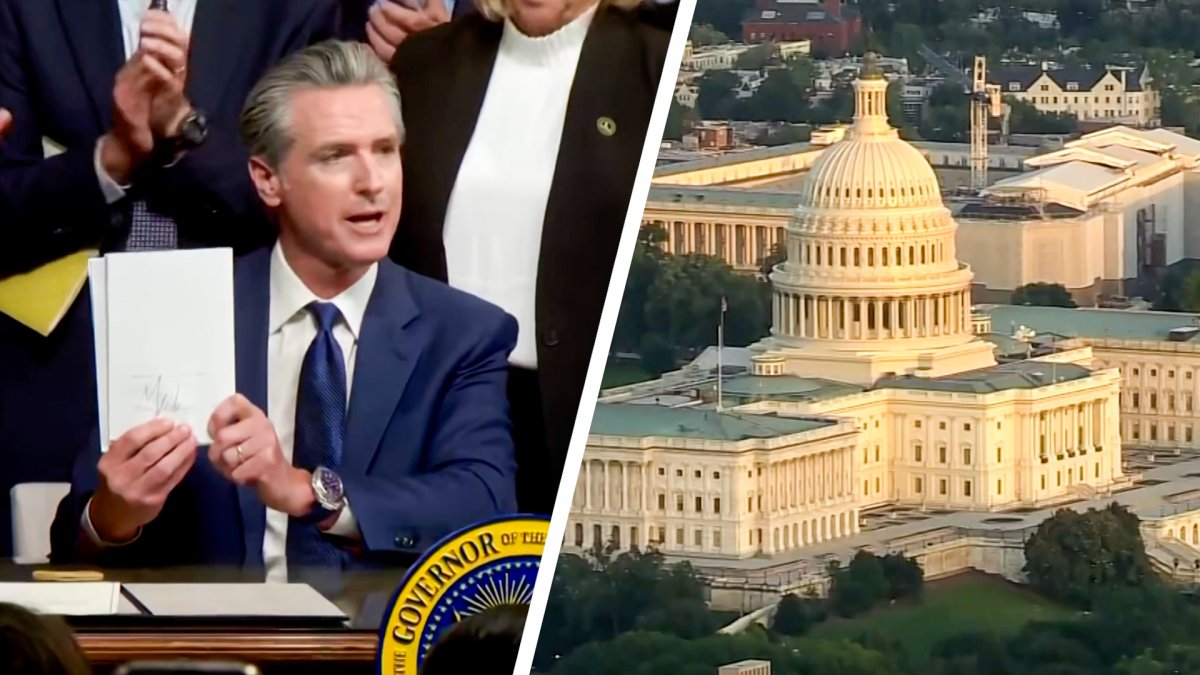Proposition 50, the only statewide measure on California’s November ballot, is about the balance of power in Congress.
It would redraw the lines of California’s 52 Congressional districts, in an effort to get Democrats five more seats in the U.S. House.
Now, there’s a word for this: it’s called gerrymandering. That word was coined more than 200 years ago, when Governor Elbridge Gerry of Massachusetts signed a law to create a twisty, winding district that looked kind of like a salamander. A political cartoon portrayed the proposed district as an especially menacing salamander, with sharp claws and a pointed tongue, and proclaimed it a “Gerry-mander,” giving birth to a new word. (You can’t make this stuff up.)
Prop 50 unabashedly asks voters to approve partisan gerrymandering of California’s Congressional district lines — but its supporters argue that the ends justify the means.
Messing with Texas
It may be a California ballot measure, but the story of Prop 50 actually begins in the Lone Star State. Earlier this year, President Trump asked Republicans in Texas to do some old-fashioned gerrymandering. Despite tenacious protests from Democrats in the state legislature, the Republican majority moved the districts around to make five more of Texas’ Congressional seats easily winnable by Republicans. Their goal is to help the GOP keep control of the U.S. House in next year’s midterm election.
Here in California, where Democrats already represent 43 of the state’s 52 Congressional districts, Governor Newsom wants to neutralize Republican gerrymandering efforts in Texas and other red states — but he needs voters’ approval to do it. You see, unlike in Texas, California has an independent commission that draws district maps designed to be as fair as possible. Prop 50 would temporarily replace those non-partisan maps with a gerrymandered map that favors Democrats — and keep it that way for four years.
Fighting fire with fire
Supporters say Prop 50 may be a partisan political maneuver, but it’s the exact same one Texas is using. They argue California Democrats are simply fighting fire with fire, using the same tactics as Texas to win back the same number of House seats.
Prop 50 backers say President Trump has actively punished California during the early months of his second term in office, citing ICE raids and the withholding of disaster relief funds as examples, and they argue that a Democrat-controlled House could help protect California from his wrath. Governor Newsom, in particular, hasn’t been shy about saying he believes President Trump wants to become a dictator, and that the midterm election is Democrats’ best chance to stop him.
Two wrongs don’t make a right
Opponents say Prop 50 is dirty politics, plain and simple. Texas may be doing it, but they say two wrongs don’t make a right, and California shouldn’t follow suit. They point out that California voters overwhelmingly approved the creation of an independent commission to draw Congressional districts — so, they ask, why give the power back to politicians, even temporarily?
Citing examples of Democratic incumbents whose campaigns would benefit from Prop 50’s partisan redistricting, opponents have called Prop 50 a power grab by Democrats that disenfranchises Republicans and independent voters.
An expensive battle
Prop 50’s opponents have raised more than 40 million dollars, and most of it comes from one guy: Charles Munger, Jr. His father, Charlie Munger, was Warren Buffett’s business partner, and oversaw the staggering growth of Berkshire Hathaway into a global business empire. Charles Jr. inherited a fortune, and used some of his wealth to bankroll the original ballot measures that created the independent Citizens’ Redistricting Commission more than a decade ago.
Munger is a moderate Republican, just like former Governor Arnold Schwarzenegger, who was among the earliest advocates for a non-partisan redistricting commission. Schwarzenegger has appeared in television ads for the No on 50 campaign.
Meanwhile, the Yes on 50 campaign has some star power of its own, with an October television ad featuring former President Barack Obama speaking directly to the camera. It’s part of a steady stream of ads featuring prominent Democrats, from Elizabeth Warren to AOC, telling California voters the whole country’s future is in their hands.
The money for those ads comes from a “Yes” side that’s raised nearly $100 million and counting, with a lot of it coming from Governor Newsom’s own campaign war chest. Newsom is widely expected to run for president in 2028, and experts have noted that in the campaign for Prop 50, he’s putting his political future on the line.
Notable endorsements
Of course, the governor tops the list of those endorsing Prop 50 — he’s the one putting it on the ballot, after all — but he’s in good company, joined by former President Obama, the editorial board of the San Francisco Chronicle, and a long list of unions, from nurses to firefighters.
Former Governor Schwarzenegger is the most recognizable face on the “no” side, along with former House Speaker Kevin McCarthy, the California Republican Party, and the editorial board of the Orange County Register.
Pulling ahead in the polls
A steady stream of polls has shown Prop 50 gaining momentum since it was announced in August. One of the latest, a Co/Efficient poll taken in late September with data up through October 1, shows 54 percent of likely voters saying they’d vote “yes” on Prop 50, and 36 percent saying they’d vote “no,” with 10 percent of those who responded saying they’re still undecided.

